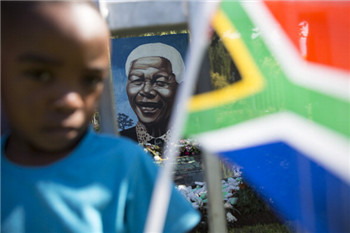(单词翻译:单击)

I arrived in Johannesburg to find it sunk in gloom — literally. The lights go out regularly, often for hours at a time.
抵达约翰内斯堡后,我发现这里已陷入黑暗之中——是字面意义上的黑暗。停电熄灯是家常便饭,一停往往就是几个小时。
Eskom, the state-owned electricity company, compensates for its lack of investment with “load shedding” or power cuts.
南非国家电力公司(Eskom)用“拉闸限电”或停电来弥补其投资匮乏。
The darkness is tough on families, but on businesses too, and is a drag on investment and expansion.
黑暗让南非家庭的日子不好过,也让企业的日子不好过,还拖累着投资和扩张。
Economic growth is low and unemployment high. Beggars with cardboard signs plead with drivers as they stop at red lights. That is, when the lights are working; during power cuts they go dark.
经济增速缓慢,失业率高企。在司机等待红灯时,乞丐举着硬纸壳做的牌子向司机行乞。当然,那是在红绿灯仍然正常运转的情况下。在停电的时候,红绿灯也不亮。
After falling for five years, murders rose in 2013-14 for the second consecutive year, to more than 17,000.
在谋杀案件数量第五年下降之后,2013-14年度南非的谋杀案件数量连续第二年上升,增加至逾1.7万起。
Jacob Zuma, the president, sneered in May at opposition members of parliament who demanded that he pay back taxpayers’ funds spent on his private residence at Nkandla.
南非议会反对党议员要求总统雅各布嘠魹(Jacob Zuma)退还花在其位于恩坎德拉(Nkandla)的私人住宅上的纳税人的钱,而5月祖玛曾对此嗤之以鼻。
Although a report by the public prosecutor last year recommended that Mr Zuma return some of the money, a police investigation said that upgrades at the residence were security necessities. They included a swimming pool that could be used to put out fires.
尽管去年一位检察官公布的报告建议祖玛返还部分资金,但警方调查称,对祖玛私人住宅进行升级是必要的安全措施。住宅升级包括建造一座可以用来灭火的游泳池。
But amid the malaise, I saw three reasons to be cheerful.
但在弥漫的不满情绪之中,我发现了3个值得庆贺的理由。
3 Speech in South Africa is free and ferocious. An MP debating the government’s decision to allow Omar al-Bashir, the Sudanese president, to leave South Africa in spite of an arrest warrant from the International Criminal Court and a local court order, called the ruling African National Congress “a lawless regime” in a debate broadcast live on television.
圠幓蒗v论是自由而激烈的。政府决定不顾国际刑事法院(International Criminal Court)的逮捕令和地方法院的命令,允许苏丹总统奥马尔巴希尔(Omar al-Bashir)离开南非,一名议会议员在电视直播的辩论中对政府的这一决定提出异议时,称执政党非洲人国民大会(African National Congress,简称非国大)是“一个无法无天的政权”。
Journalists assail Mr Zuma and his government. “Where is the ANC’s leadership? Too many have given up and are looting as much as they can while the going is good,” the columnist Justice Malala wrote in The Times, a local newspaper.
媒体人士抨击祖玛及其政府。“非国大的领导层在哪里?太多人已经放弃了,并且趁情况良好时尽可能多地掠夺,”专栏作家贾斯蒂斯氠拉拉(Justice Malala)在当地报纸《The Times》上写道。
South African press freedom faces threats. Parliament passed the Protection of State Information Bill, with severe punishments for leaking or possessing a wide range of information. But Mr Zuma has not yet signed it. Journalists I spoke to thought he was wary of the law being challenged in the Constitutional Court, which brings me to the second reason to be cheerful:
南非媒体自由面临威胁。议会通过了《国家信息保护法案》(Protection of State Information Bill),对泄露或掌握各种信息施以严厉惩罚。但是祖玛尚未签署该法案。跟我聊过的记者认为,祖玛担心该法案会在宪法法庭(Constitutional Court)受到挑战,这便引出了第二个值得庆贺的理由:
The judiciary remains resolutely independent. There have been persistent fears that South Africa’s judges would be forced to bend to the will of the government. It hasn’t happened. Even Mr Zuma’s new appointments, selected from a list submitted to him by the Judicial Service Commission, have dispelled fears that they would do his bidding.
圠幓蒗司法体系仍然是绝对独立的。人们一直担心南非的法官会被迫屈从于政府的意志。这种情况并未发生。即使是祖玛新任命的法官——从司法服务委员会(Judicial Service Commission)提交的名单中选出——也打消了人们对他们会遵照祖玛的命令办事的担忧。
The Mail & Guardian, a critic of South African malpractice, called Mogoeng Mogoeng, a controversial appointment as chief justice, “the ‘puppet’ who tore off his strings”. The paper said of Mr Mogoeng: “He was widely expected to be President Jacob Zuma’s lackey, but he has since proved some detractors wrong.”
对南非的不法行为进行批判的媒体《邮政卫报》(Mail & Guardian),把莫洪恩莫洪恩(Mogoeng Mogoeng)称为“扯断了掉提线的‘木偶’”。莫洪恩被任命为宪法法院院长引起了争议。该报纸是这样说莫洪恩的:“他被广泛认为是雅各布嘠魹总统的听差,但是后来的事实证明一些诋毁他的人错了。”
The government does not enjoy this judicial independence. Blade Nzimande, the higher education minister, accused some judges of “deliberately overreaching”.
政府并不那么享受这种司法独立。南非高等教育部部长布莱德椠偠曼德(Blade Nzimande)指责一些法官“故意干涉职权范围以外的事情”
It is also disturbing that the government ignored the Pretoria high court’s order that it detain Mr Bashir. The court responded by asking prosecutors to consider charging the government and added: “A court is the guardian of justice, the cornerstone of a democratic system based on the rule of law. If the state...搠漀攀猀 not abide by court orders, the democratic edifice will crumble stone by stone until it collapses and chaos ensues.”
政府对比勒陀利亚(Pretoria)高级法院要求其逮捕巴希尔的命令置之不理,这也令人不安。该法院对此的回应是要求检方考虑指控政府,并补充称:“法院是司法的守护者,是以法治为基础的民主体系的基石。如果政府……不遵守法院命令,这座民主大厦将一块一块地坍塌,直到大厦倾覆、混乱随之而来。”
Independent judges are helping to keep that chaos at bay.
独立的法官有助于阻止这种混乱。
So are ordinary people, whose projects are the third reason to be cheerful. I was in Johannesburg to chair a symposium last week on corporate longevity, part of a year-long Financial Times investigation into why some companies live for centuries while most die within a few years or, at most, decades.
渠通百姓亦然,他们是第三个值得庆贺的理由。不久前我在约翰内斯堡主持一个关于企业寿命的座谈会,这是英国《金融时报》关于为何有些企业存活数个世纪而多数企业则在短短几年或至多几十年内消亡的调查的一部分。
There were several old companies at the event, but there were new ones too. There was Ezlyn Barends, whom I interviewed on stage, a young businesswomen and leader of two mentoring organisations. There were others who came up to me afterwards to discuss their business ventures.
在那次活动中有几家老牌公司,不过也有新公司。我在台上采访了埃兹琳巴伦兹(Ezlyn Barends),她是一位年轻的女商人、两家人才孵化机构的老板。后来也有其他人过来找我讨论他们的经商经历。
In downtown Johannesburg, once seemingly abandoned to squatters and crime, entrepreneurs are restoring apartments and running restaurants, markets, galleries and cinemas. These places are filled with relaxed, racially mixed crowds, busily proving that a country is more than its government.
约翰内斯堡市中心一度似乎被抛弃,沦为寮屋者的天下,犯罪活动猖獗,而如今创业者正在收回公寓,开办餐馆、市场、画廊和影院。这些地方随处可见来自各个种族的人群,他们神态放松,忙着证明政府不能代表一个国家的全貌。


